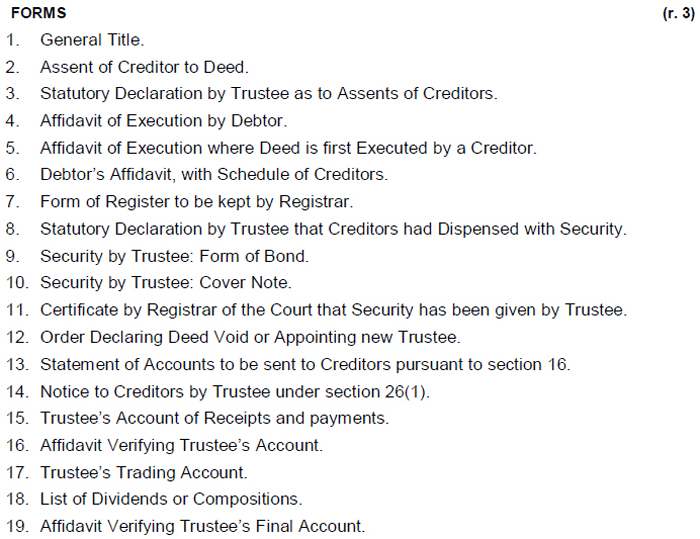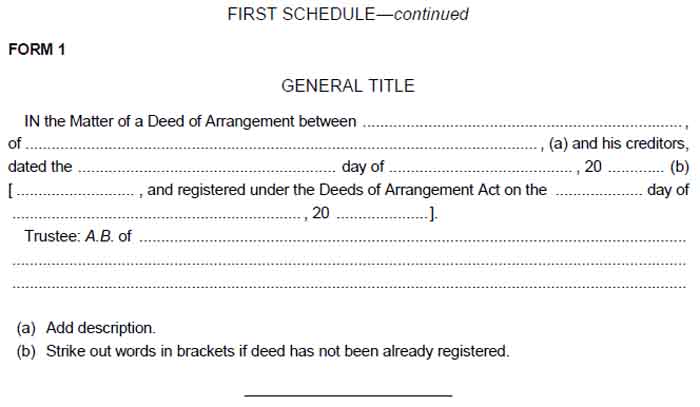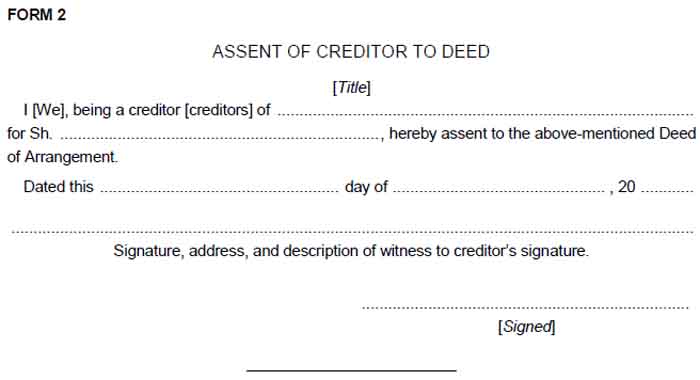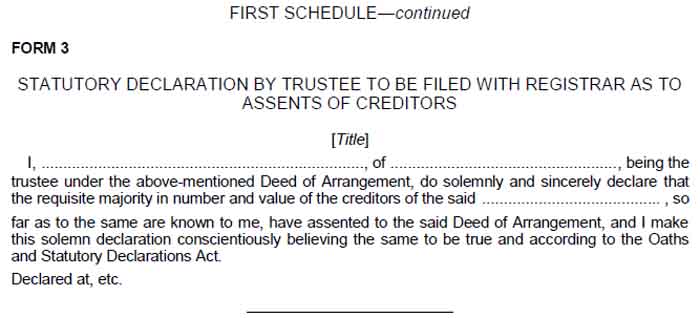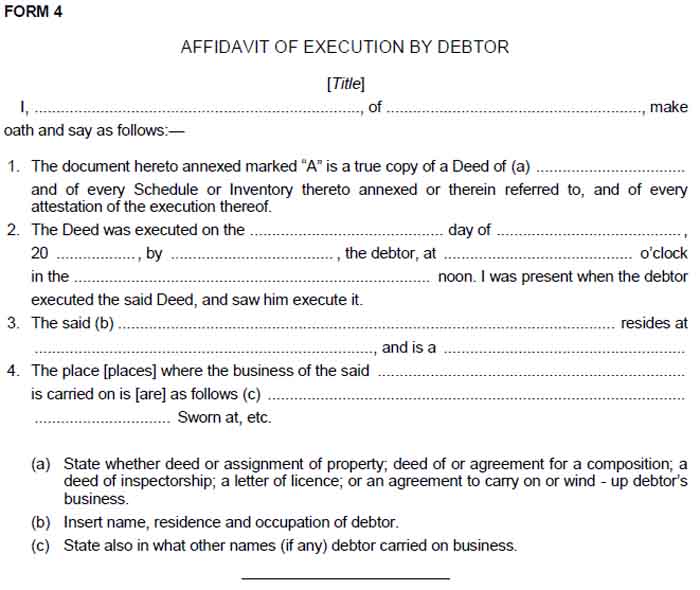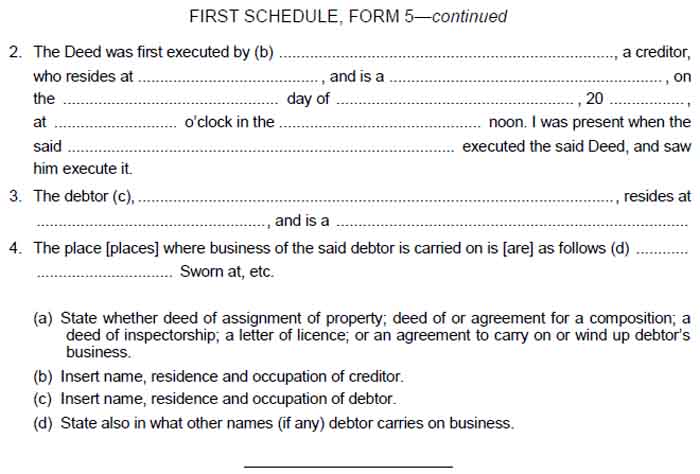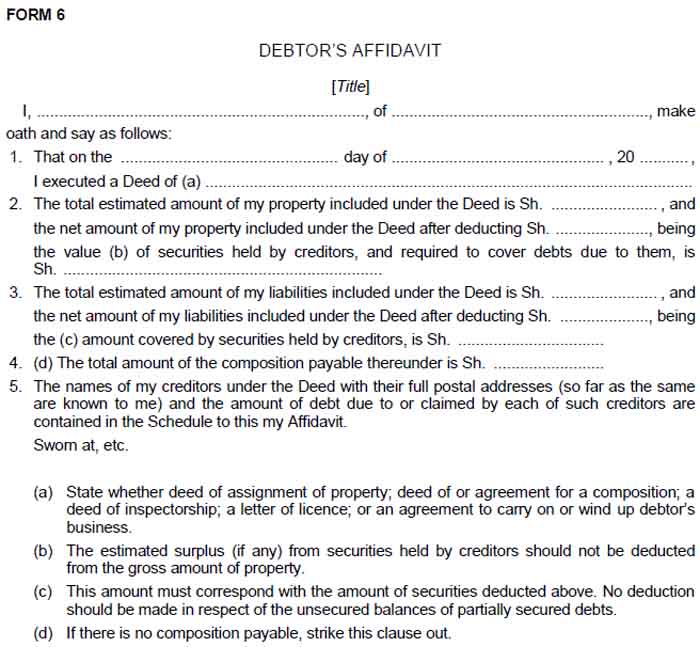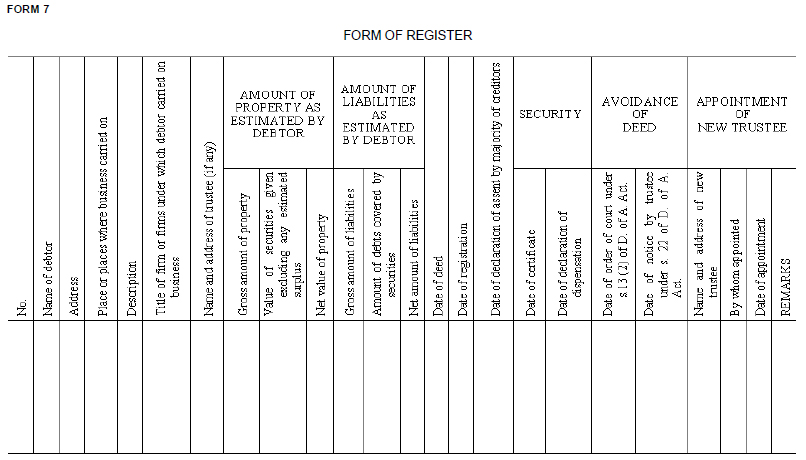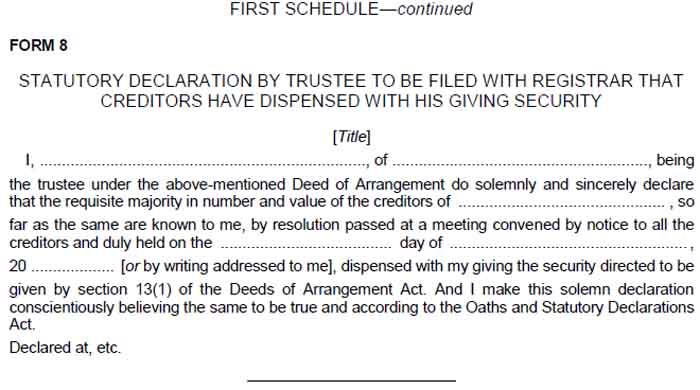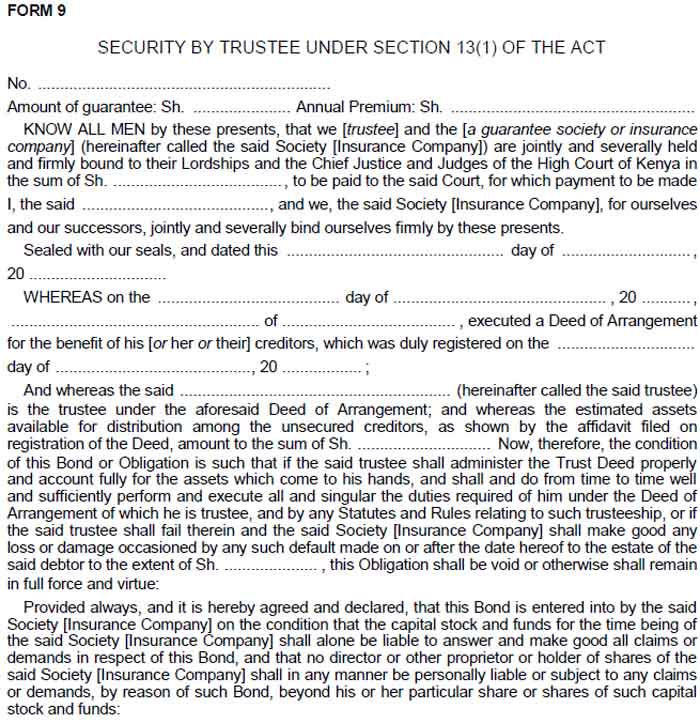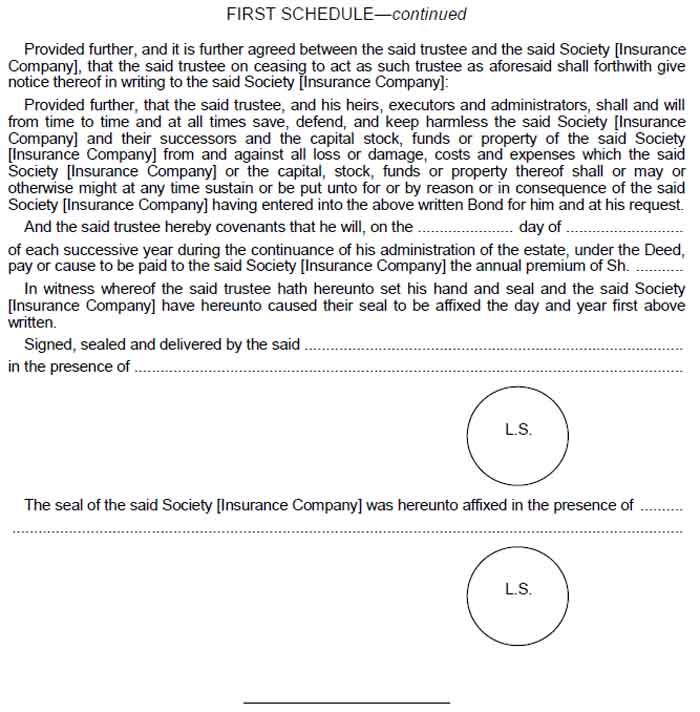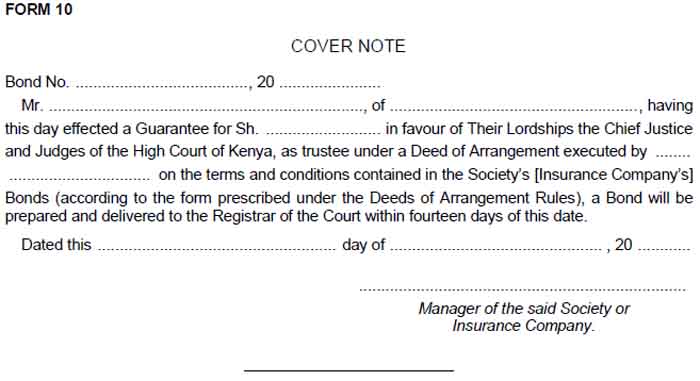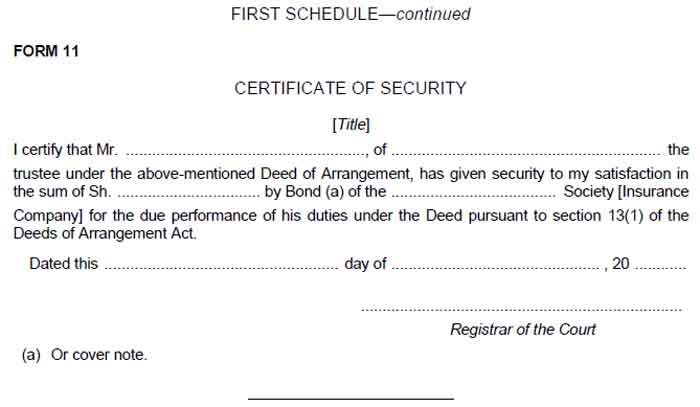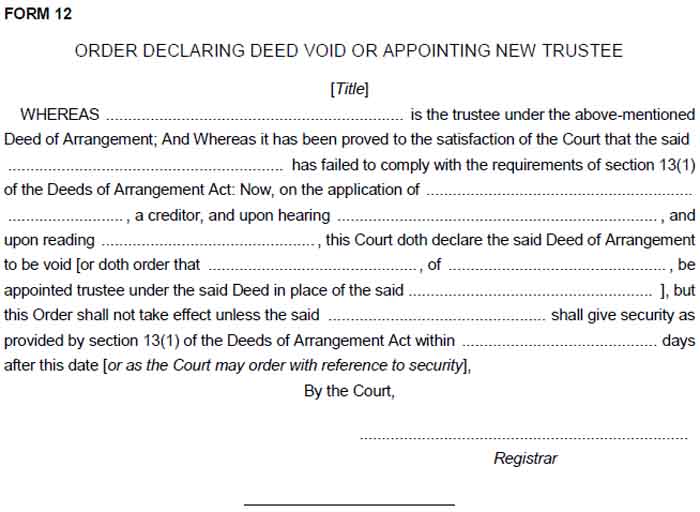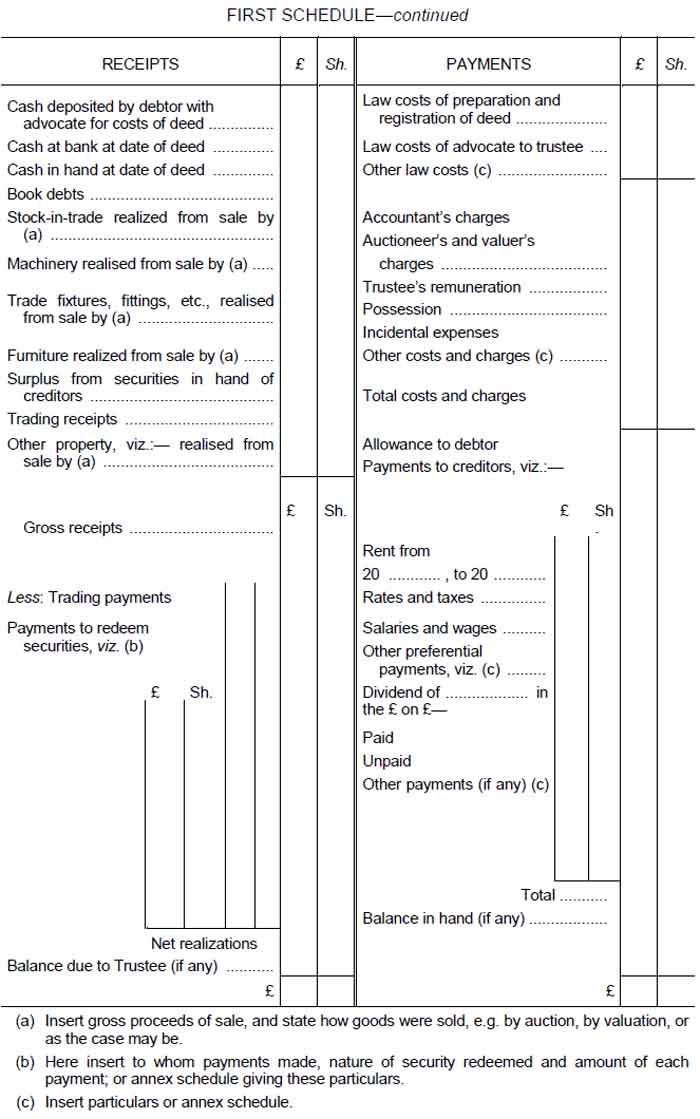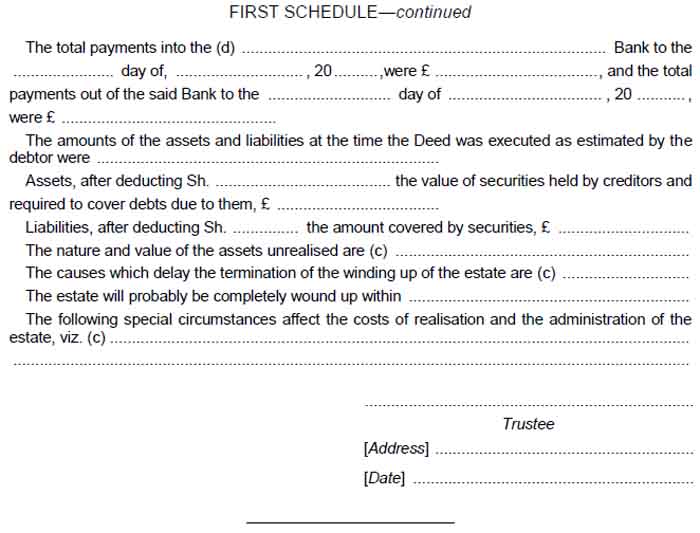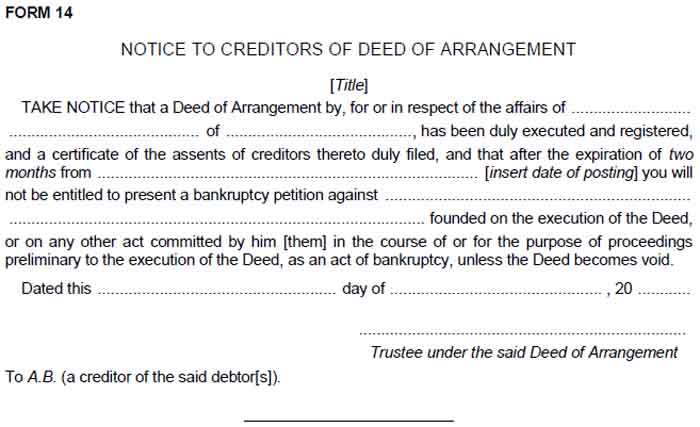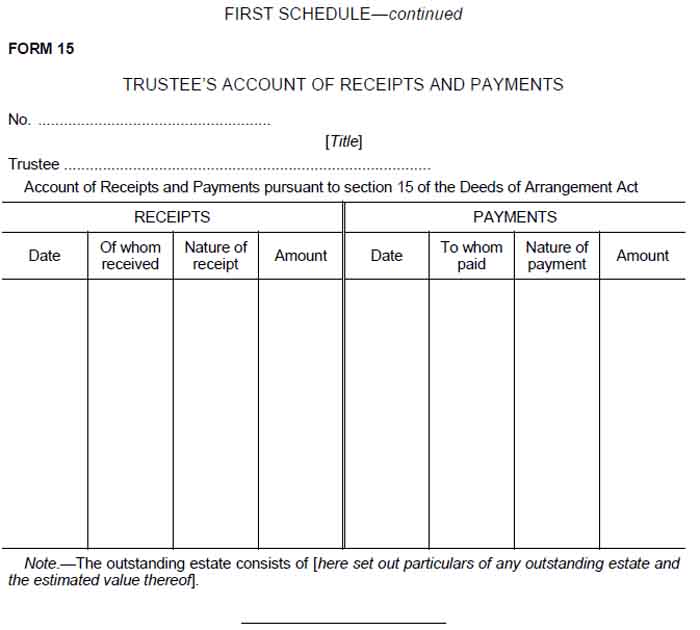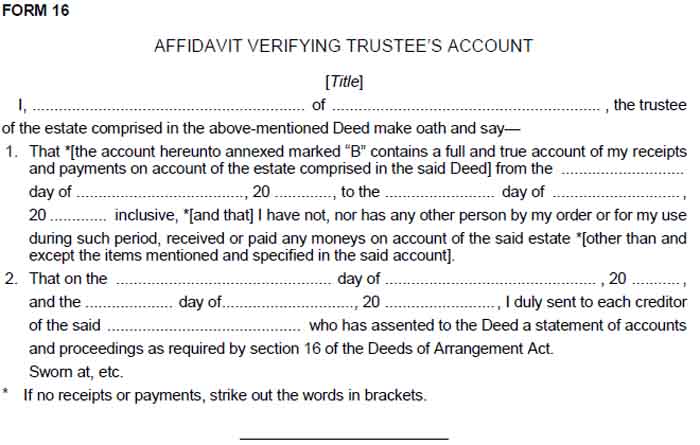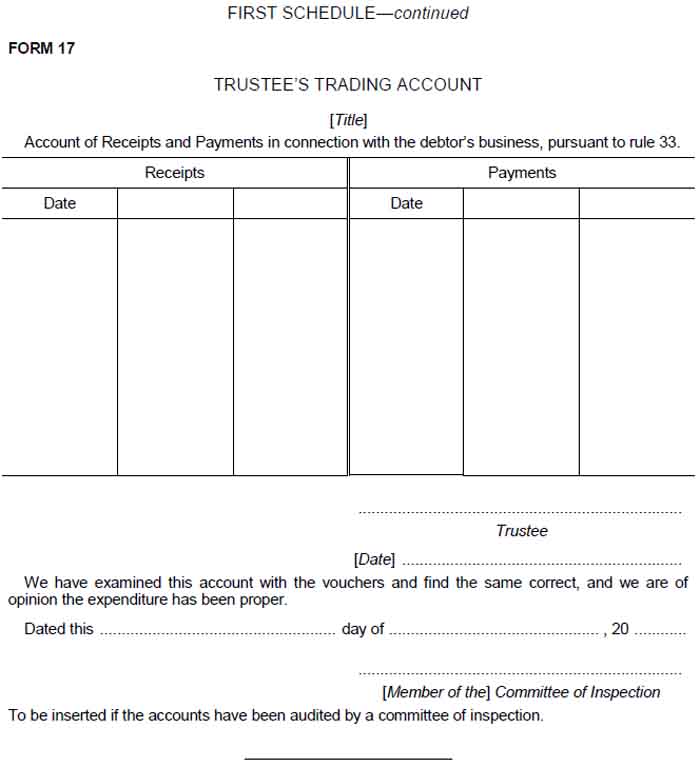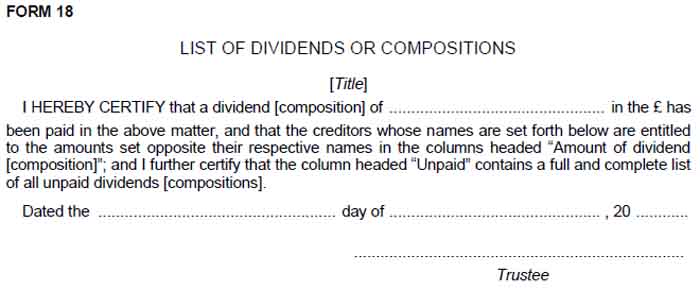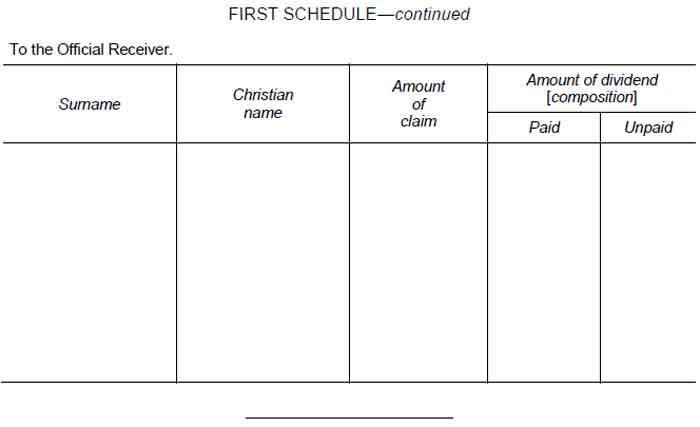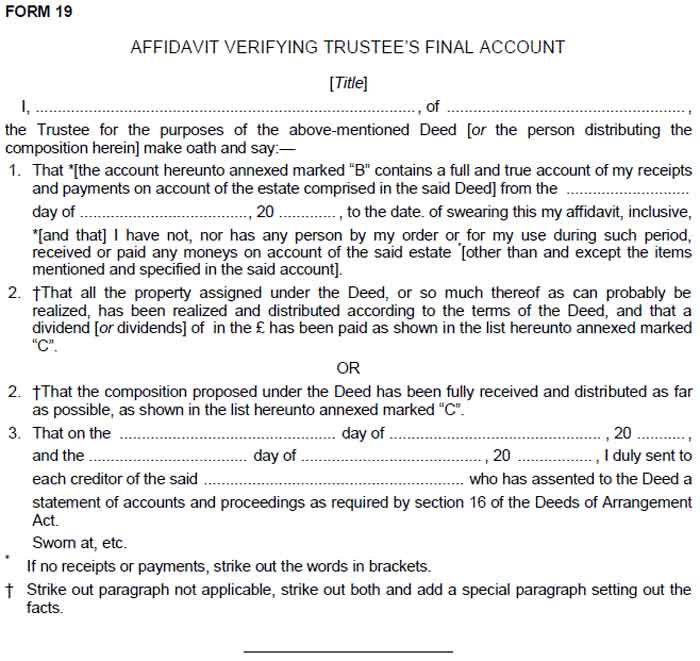|
|
DEEDS OF ARRANGEMENT RULES
ARRANGEMENT OF RULES
PART I – DEEDS OF ARRANGEMENT RULES
PART II – REGISTRATION OF DEEDS
| 5. |
Endorsement on copy of deed for filing.
|
| 6. |
Execution of deed by trustee prior to registration.
|
| 7. |
Certificate of registration on original deed.
|
Searches and Extracts
| 8. |
Extracts from filed copy of deed.
|
| 9. |
Search and inspection in court.
|
Transmission of Copies to District Registries or other Courts
| 10. |
Endorsement to be made on copies transmitted to District Registries.
|
| 11. |
Transmission of copy by post.
|
| 12. |
Copies to be numbered and filed.
|
| 13. |
Extra copies of deed to be furnished in certain cases.
|
| 15. |
Certified copies and searches.
|
PART III – PROCEDURE
| 16. |
Applications, how to be made.
|
| 17. |
Applications, to whom to be made.
|
| 19. |
Affidavits by parties other than applicant.
|
| 20. |
Chambers and adjournment to court.
|
| 22. |
Application to determine liability on bond.
|
PART IV – TRUSTEES
| 25. |
Copy of affidavit of debtor to be filed on giving security.
|
| 26. |
Certificate that security given to be sent to Registrar.
|
| 27. |
Notice by new trustee of appointment.
|
| 28. |
Notice to creditor of execution of deed, etc.
|
| 29. |
Audit of trustee’s accounts.
|
| 30. |
Certificate of audit.
|
PART V – ACCOUNTS
| 31. |
Transmission of accounts.
|
| 32. |
Receipts and payments.
|
| 34. |
Accounts, size of paper.
|
| 38. |
Partnership accounts.
|
| 40. |
Affidavit of no receipts or payments.
|
| 41. |
Affidavit verifying final account.
|
| 42. |
Summary of accounts or modified forms of account in particular cases.
|
| 43. |
Swearing affidavits respecting accounts.
|
PART VI – FEES
SCHEDULES
DEEDS OF ARRANGEMENT RULES
[Cap. 31 of (1948), Sub. Leg., L.N. 336/1957.]
RULES UNDER SECTION 29
PART I – DEEDS OF ARRANGEMENT RULES
| 1. |
Short title
These Rules may be cited as the Deeds of Arrangement Rules.
|
| 2. |
Interpretation
In these Rules, except where the context or subject-matter otherwise requires—
“debtor” means any person by or for whom, or in respect of whose affairs, a deed of arrangement as defined by the Act shall be made or entered into, and includes a firm of persons in co-partnership;
“deed” means any deed of arrangement as defined by the Act;
“Registrar” means the Registrar of Deeds of Arrangement constituted by the Act;
“Registrar of the Court” includes a District or Deputy Registrar of the Court having jurisdiction under the Act.
|
| 3. |
Forms
| (1) |
The forms in the Schedule or forms of a similar character with such variations as circumstances may require shall be used.
|
| (2) |
The Chief Justice may from time to time alter any of the forms in the Schedule or substitute new forms in lieu thereof; and any forms so altered or substituted shall be published in the Gazette.
|
|
PART II – REGISTRATION OF DEEDS
| 4. |
Affidavits
Affidavits made pursuant to section 7 of the Act shall be filed with the Registrar. [Forms 4, 5, 6.]
|
| 5. |
Endorsement on copy of deed for filing
Upon every copy of a deed which is presented for filing there shall be endorsed, by the person who presents it, the name of the debtor, the date of the deed and of the filing thereof, the total amount of duty with which the deed is stamped and a certificate signed by the debtor or his advocate or the person who presents the copy for filing that the copy is a true copy of the deed.
|
| 6. |
Execution of deed by trustee prior to registration
An assignment of property by a debtor to a trustee or assignee for the benefit of his creditors shall not be registered under the Act unless it appears from the assignment that it has been or purports to have been executed, or (if not made by deed) signed by the trustee or assignee; and the Registrar shall before registering the assignment satisfy himself that the assignment purports to have been duly executed or signed as the case may be by the trustee or assignee thereunder.
|
| 7. |
Certificate of registration on original deed
When a deed is registered under the Act there shall be written on the original deed a certificate that the deed has been duly registered as prescribed by the Act, and the date of registration; and the certificate shall be sealed with the seal of the Registrar.
|
| 8. |
Extracts from filed copy of deed
Extracts from the filed copy of a deed shall be limited to the date of execution and registration, the names, addresses and descriptions of the debtor and other parties to the deed and a short statement of the nature and effect of the deed.
|
| 9. |
Search and inspection in court
| (1) |
The Registrar of the court shall permit inspection of the index kept by him at all times during court office hours and the taking of such extracts as are permitted by rule 8 upon payment of the prescribed fee.
|
| (2) |
He shall also cause certified or uncertified copies to be made of any copy of a deed filed in his office as required, and shall issue the same upon payment of the prescribed fee.
|
|
Transmission of Copies to District Registries or other Courts
| 10. |
Endorsement to be made on copies transmitted to District Registries
Upon every copy of a deed which pursuant to the Act is transmitted to any District Registry of the High Court or to any other court, there shall be written copies of every endorsement or certificate written on the original deed or on the filed copy thereof; and the copies shall be signed by the Registrar or by some other person duly authorized by him.
|
| 11. |
Transmission of copy by post
Copies of deeds required to be transmitted to any District Registry or other court may be sent by registered letter post.
|
| 12. |
Copies to be numbered and filed
The Registrar of the court shall number the copies of deeds received by him in the order in which they are received, and shall file and keep them in his office.
|
| 13. |
Extra copies of deed to be furnished in certain cases
Where a debtor has a place of business or residence in some place within the area of a District Registry, there shall be furnished to the Registrar sufficient copies of the deed to enable him to transmit one to the District Registry of each area in which the place of business or residence is situated.
|
| 14. |
Index to be kept
The Registrar of the court shall keep an index, alphabetically arranged, in which he shall enter, under the first letter of the surname of the debtor, the surname, with his Christian name, or such name as he may have, address and description, and the number which has been affixed to the copy.
|
| 15. |
Certified copies and searches
The provisions of sections 11 and 27 of the Act shall apply to all documents filed with the Registrar pursuant to the Act or these Rules.
|
PART III – PROCEDURE
| 16. |
Applications, how to be made
All applications other than applications under section 9 of the Act which by the Act or these Rules are directed or allowed to be made to the High Court shall be deemed to be proceedings in bankruptcy, and subject to the Act and these Rules shall be made in accordance with and in the manner prescribed for proceedings under the Bankruptcy Act (Cap. 53) and the Bankruptcy Rules, with such variations as the circumstances may require, and shall be supported by affidavit:
Provided that applications for extension of time for procuring the assent of creditors to a deed under subsection (1) of section 5 of the Act or for filing the statutory declaration required by subsection (4) of section 5 of the Act may be made ex parte and shall be supported by affidavit unless the court shall in any case otherwise order.
|
| 17. |
Applications, to whom to be made
| (1) |
The application, together with the affidavit in support, shall be filed with the Registrar of the court, who shall appoint a day for the hearing of the application not earlier than fourteen days from the date of such filing.
|
| (2) |
The Registrar of the court may direct notice of the application to be served on such person or persons as he thinks fit, but in the absence of any such direction the notice, together with copies of the affidavits in support, shall be served, when the application is made by the trustee, on the debtor and on any creditor or other person to be affected thereby, and, when made by the debtor, on the trustee and on any creditor or other person to be affected thereby, and, when made by a creditor, on the trustee and the debtor.
|
|
| 18. |
Evidence
Evidence to be used on the application shall, unless the court otherwise orders, be given by affidavit, but any party opposing the application may, by notice in writing addressed to any deponent or his advocate, require the attendance of the deponent for cross-examination; and a copy of every such notice shall be filed with the Registrar of the court.
|
| 19. |
Affidavits by parties other than applicant
Affidavits intended to be used by any party to such application, other than the applicant, shall be filed in the court, and copies served on the applicant not less than four days before the day appointed for the hearing of the application.
|
| 20. |
Chambers and adjournment to court
All applications referred to in the preceding rules shall be heard and determined in chambers, but a judge may in any case adjourn the application to be heard and determined in court.
|
| 21. |
Service of application under section 13(2)
Notice of any application under subsection (2) of section 13 of the Act to declare a deed void, or to appoint another trustee, shall be served on the trustee named in the deed not less than eight days before the day appointed for the hearing.
|
| 22. |
Application to determine liability on bond
If a trustee fails to pay to a guarantee society or insurance company, party to a bond given by him under rule 23, the annual premium payable by him within fourteen days of the date when the premium becomes payable, or if the society or insurance company refuses to accept the premium, the society or insurance company may apply to the Registrar of the court to determine its liability under the bond and the Registrar of the court, if satisfied by affidavit that default in payment of the premium has been made by the trustee, or that the refusal of the society or insurance company to accept the premium in order that its liability may be determined is reasonable, may order that, as from the date of expiration of the year for which the last premium was paid, or as from the date of the order, whichever may be the later date, all further liability of the society or insurance company shall cease and determine save and except in respect of any loss or damage occasioned by any act or default of the trustee in relation to his duties as trustee previously to the cesser and determination of liability, and the Registrar of the court may exercise any of the powers conferred by subsection (2) of section 13 of the Act.
|
| 23. |
Procedure on application under section 13(2)
Notice of any application under rule 22 shall be served on the three largest creditors named in the affidavit filed on registration of the deed not less than eight days before the day appointed for hearing the application, and any creditor may appear and be heard thereon, and rules 16 to 20 inclusive shall, so far as applicable, be observed.
|
PART IV – TRUSTEES
| 24. |
Security by trustee
| (1) |
The security to be given by the trustee under a deed of arrangement pursuant to subsection (1) of section 13 of the Act shall be by bond of a guarantee society or insurance company.
|
| (2) |
The Registrar of the court shall have an absolute discretion as to acceptance or refusal of the bond of any guarantee society or insurance company tendered to him.
|
| (3) |
Pending the preparation of the bond, a cover note of an acceptable guarantee society or insurance company in the prescribed form shall be accepted by the Registrar of the court as temporary security. [Form 9, 10.]
|
|
| 25. |
Copy of affidavit of debtor to be filed on giving security
The trustee, on giving security for the due administration of the deed and for accounting fully for the assets pursuant to subsection (1) of section 13 of the Act, shall produce and hand to the Registrar of the court to whom the security is to be given a copy, certified by him, of the affidavit of the debtor filed on the registration of the deed, and the Registrar of the court shall file the certified copy.
|
| 26. |
Certificate that security given to be sent to Registrar
When security has been given by a trustee pursuant to subsection (1) of section 13 of the Act, the Registrar of the court to whom it is given shall, within three days after receipt thereof, send to the Registrar a certificate signed by him that security has been given and the Registrar shall forthwith file it; and the Registrar of the court shall also send to the Registrar within three days after any order made under subsection (2) of section 13 of the Act has been drawn up, a copy of the order. [Forms 11, 12.]
|
| 27. |
Notice by new trustee of appointment
A trustee of a deed appointed in place of an original trustee shall forthwith send to the Registrar notice of his appointment, giving his full name and address, and showing how and when the appointment was made, and the Registrar shall forthwith file the notice.
|
| 28. |
Notice to creditor of execution of deed, etc.
Notice under subsection (1) of section 26 of the Act to a creditor of the execution of a deed and of the filing of the certificate of the assents of creditors thereto shall be sent by prepaid registered post addressed to the creditor at the address mentioned in the affidavit of the debtor filed on registration of the deed, and service shall be deemed to have been made on the day on which the notice was posted. [Forms 2, 3, 14.]
|
| 29. |
Audit of trustee’s accounts
Where the Official Receiver in Bankruptcy causes a trustee’s accounts to be audited, the trustee shall, within seven days of service upon him by registered post of an order made by the Official Receiver directing him so to do, deliver to the Official Receiver copies of all accounts transmitted by him to the Official Receiver pursuant to section 15 of the Act, together with an account in similar form from the date to which the last account extended to the date of the order; and the copies and account shall be accompanied by an affidavit of the trustee verifying them.
|
| 30. |
Certificate of audit
| (1) |
The account as audited by the Registrar together with his certificate or observations thereon shall be filed and kept by the Official Receiver, and shall be open to the inspection of any creditor or of the trustee, who shall be at liberty to take a copy of the certificate or observations.
|
| (2) |
A certified copy of the certificate or observations shall be supplied to the trustee or to any creditor on application.
|
|
PART V – ACCOUNTS
| 31. |
Transmission of accounts
| (1) |
In the case of any deed executed by the debtor after the 1st January in any year, the first account shall commence at the date of execution of the deed and be brought down to the 31st December next following the date thereof, and shall be transmitted within thirty days, and thereafter each succeeding account shall be for the year from the 1st January to the 31st December in each year, unless the estate is wound up prior to the 31st December, when the account shall run from the previous 1st January in that year to the date of closing the account:
Provided that, in the case of any deed executed on or after the 1st October in any year, the account shall be filed not later than the 31st December in the following year.
|
| (2) |
Each account transmitted under this rule shall be verified by affidavit.
|
| (3) |
The trustee shall pay the prescribed fee to the Official Receiver at the time when he transmits his account. [Forms 15, 16.]
|
|
| 32. |
Receipts and payments
Each receipt and payment shall be entered in such a manner as sufficiently to explain its nature.
|
| 33. |
Trading account
When the trustee carries on a business, a trading account shall be forwarded as a distinct account, and the total of receipts and payments on the trading account shall alone be set out in the yearly account. [Form 17.]
|
| 34. |
Accounts, size of paper
All accounts shall be prepared on paper of such type as may be prescribed by the Registrar.
|
| 35. |
Petty expenses
Petty expenses shall be entered in accounts in sufficient detail to show that no estimated charges are made.
|
| 36. |
Realizations
Where property has been realized, the gross proceeds of sale shall be entered as a receipt and the necessary disbursements and charges shall be entered as payments.
|
| 37. |
Dividends
Where dividends or instalments of a composition are distributed under the deed, the total amount of each dividend or instalment shall be entered in the trustee’s accounts as one sum, and the trustee shall forward to the Official Receiver—
| (a) |
with each account in which a charge in respect of dividend or composition appears a statement showing the amount of the claim of each creditor and the amount of dividend or composition payable to each creditor, distinguishing in the statement the dividends or instalments paid and those remaining unpaid; and
|
| (b) |
with his final account a complete statement in similar form showing the amount of the claim and the full amount of dividend or composition paid to or reserved for each creditor. [Form 18.]
|
|
| 38. |
Partnership accounts
Where the deed has been granted by a firm of debtors in partnership, distinct accounts shall be transmitted of the joint estate and of each partner’s estate.
|
| 39. |
Imperfect accounts
Where it appears to the Official Receiver that the account transmitted by a trustee under a deed of arrangement is incomplete, or requires amendment or explanation, the Official Receiver may require the account to be completed or amended, or require the trustee to furnish explanations with reference to any of the entries appearing therein; and any such requirement by the Official Receiver may be enforced in the same manner as the transmission of accounts under section 15 of the Act.
|
| 40. |
Affidavit of no receipts or payments
Where a trustee has not since the date of his becoming trustee, or since the last time that his accounts have been transmitted, as the case may be, received or paid any money on account of the debtor’s estate, he shall, at the period when he is required to transmit his accounts to the Official Receiver, forward to the Official Receiver an affidavit of no receipts or payments.
|
| 41. |
Affidavit verifying final account
As soon as a trustee has realized all the property comprised in a deed, or so much thereof as can be realised without unduly protracting the trusteeship, and has distributed a final dividend, or final instalment of composition, or in any other case as soon as the trusts of the deed and the obligations of the trustee have been completely fulfilled, the trustee shall forthwith transmit his final account together with an affidavit verifying it. [Form 19.]
|
| 42. |
Summary of accounts or modified forms of account in particular
cases
In any case in which it appears to the Official Receiver that an account of receipts and payments in the form and containing the particulars specified in these Rules may for special reasons be dispensed with, the Official Receiver may direct the trustee to transmit instead of accounts in the form therein specified, such a summary of his accounts or modified statement of accounts as to the Official Receiver appears sufficient.
|
| 43. |
Swearing affidavits respecting accounts
Affidavits required by or made in pursuance of section 15 of the Act, or these Rules, shall be sworn before a commissioner for oaths, a justice of the peace or the Registrar of the court, and may, if sworn in any place outside Kenya, be sworn before any person having authority to administer an oath in that place.
|
PART VI – FEES
| 44. |
Fees
The fees payable under these Rules shall be those specified in the Second Schedule.
|
FIRST SCHEDULE
SECOND SCHEDULE [Rule 44, L.N. 336/1957.]
FEES
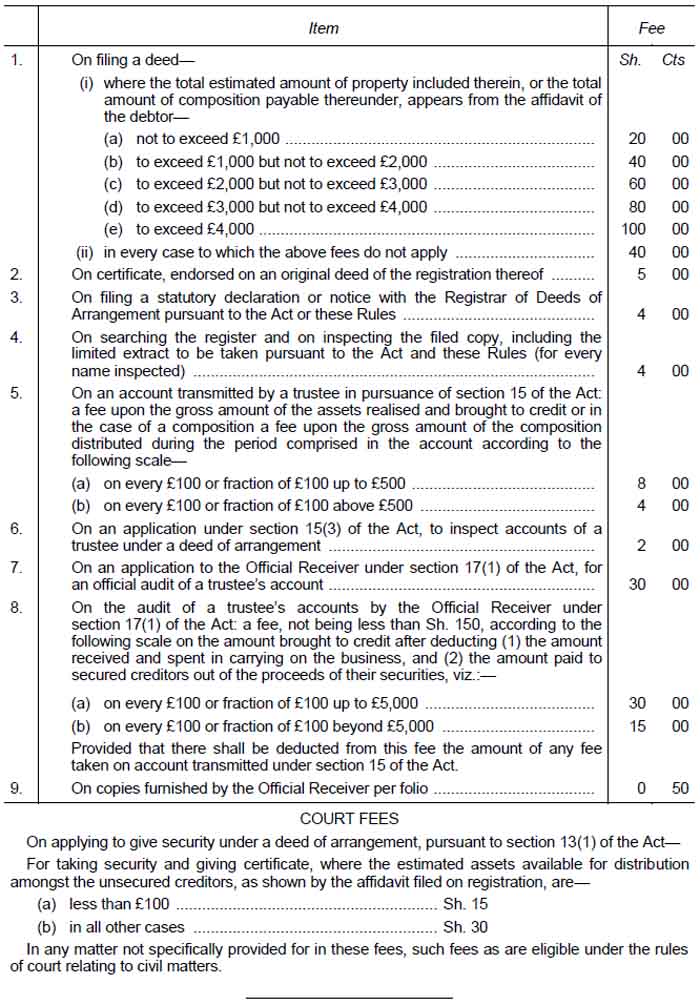
|



